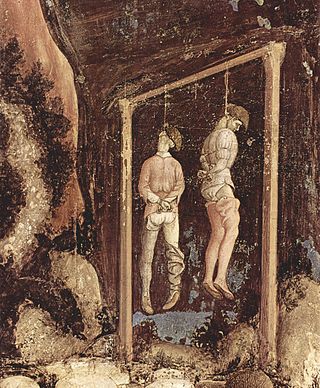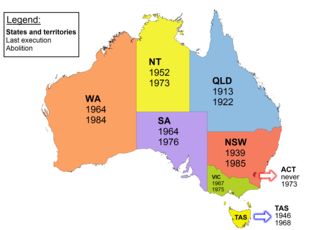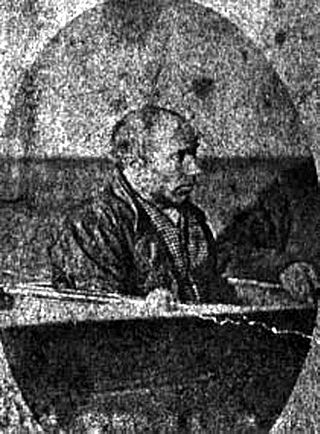Related Research Articles

The government of the Isle of Man is a parliamentary representative democracy. The Monarch of the United Kingdom is also the head of state of the Isle of Man, and generally referred to as "The King, Lord of Mann". Legislation of the Isle of Man defines "the Crown in right of the Isle of Man" as separate from the "Crown in right of the United Kingdom". His representative on the island is the Lieutenant Governor of the Isle of Man, but his role is mostly ceremonial, though he does have the power to grant Royal Assent.

Hanging is killing a person by suspending them from the neck with a noose or ligature. Hanging has been a common method of capital punishment since the Middle Ages, and is the primary execution method in numerous countries and regions. The first known account of execution by hanging is in Homer's Odyssey. Hanging is also a method of suicide.

Capital punishment in the United Kingdom predates the formation of the UK, having been used within the British Isles from ancient times until the second half of the 20th century. The last executions in the United Kingdom were by hanging, and took place in 1964; capital punishment for murder was suspended in 1965 and finally abolished in 1969. Although unused, the death penalty remained a legally defined punishment for certain offences such as treason until it was completely abolished in 1998; the last execution for treason took place in 1946. In 2004, Protocol No. 13 to the European Convention on Human Rights became binding on the United Kingdom; it prohibits the restoration of the death penalty as long as the UK is a party to the convention.
Capital punishment in Canada dates back to Canada's earliest history, including its period as a French colony and, after 1763, its time as a British colony. From 1867 to the elimination of the death penalty for murder on July 26, 1976, 1,481 people had been sentenced to death, and 710 had been executed. Of those executed, 697 were men and 13 women. The only method used in Canada for capital punishment of civilians after the end of the French regime was hanging. The last execution in Canada was the double hanging of Arthur Lucas and Ronald Turpin on December 11, 1962, at Toronto's Don Jail. The National Defence Act prescribed the death penalty for certain military offences until 1999, although no military executions had been carried out since 1946.
Capital punishment was abolished in 2019 in New Hampshire for persons convicted of capital murder. It remains a legal penalty for crimes committed prior to May 30, 2019.

Capital punishment in India is a legal penalty for some crimes under the country's main substantive penal legislation, the Indian Penal Code, as well as other laws. Executions are carried out by hanging as the primary method of execution per Section 354(5) of the Criminal Code of Procedure, 1973 is "Hanging by the neck until dead", and is imposed only in the 'rarest of cases'.

Capital punishment in Singapore is a legal penalty. Executions in Singapore are carried out by long drop hanging, and usually take place at dawn. Thirty-three offences—including murder, drug trafficking, terrorism, use of firearms and kidnapping—warrant the death penalty under Singapore law.

A Deemster is a judge in the Isle of Man. The High Court of Justice of the Isle of Man is presided over by a deemster or, in the case of the appeal division of that court, a deemster and the Judge of Appeal. The deemsters also promulgate the Laws on Tynwald Day by reading out brief summaries of them in English and Manx.

The Homicide Act 1957 is an Act of the Parliament of the United Kingdom. It was enacted as a partial reform of the common law offence of murder in English law by abolishing the doctrine of constructive malice, reforming the partial defence of provocation, and by introducing the partial defences of diminished responsibility and suicide pact. It restricted the use of the death penalty for murder.

Henry Callow was a former Second Deemster in the Isle of Man.
Wrongful execution is a miscarriage of justice occurring when an innocent person is put to death by capital punishment. Cases of wrongful execution are cited as an argument by opponents of capital punishment, while proponents say that the argument of innocence concerns the credibility of the justice system as a whole and does not solely undermine the use of the death penalty.
The legal system on the Isle of Man is Manx customary law, a form of common law. Manx law originally derived from Gaelic Brehon law and Norse Udal law. Since those early beginnings, Manx law has developed under the heavy influence of English common law, and the uniqueness of the Brehon and Udal foundation is now most apparent only in property and constitutional areas of law.

Capital punishment in Australia has been abolished in all jurisdictions since 1985. Queensland abolished the death penalty in 1922. Tasmania did the same in 1968. The Commonwealth abolished the death penalty in 1973, with application also in the Australian Capital Territory and the Northern Territory. Victoria did so in 1975, South Australia in 1976, and Western Australia in 1984. New South Wales abolished the death penalty for murder in 1955, and for all crimes in 1985. In 2010, the Commonwealth Parliament passed legislation prohibiting the re-establishment of capital punishment by any state or territory. Australian law prohibits the extradition or deportation of a prisoner to another jurisdiction if they could be sentenced to death for any crime.
Capital punishment is a legal penalty in Malaysian law.

The High Court of Justice of the Isle of Man is governed by the High Court Act 1991. There are four permanent judges of the High Court:

Capital punishment in Michigan was legal from the founding of Sault Ste Marie in 1668 during the French colonial period, until abolition by the state legislature in 1846. Michigan is one of three U.S. states never to have executed anyone following admission into the Union. The federal government, however, outside Michigan's jurisdiction, carried out one federal execution at FCI Milan in 1938.
Capital punishment in Connecticut formerly existed as an available sanction for a criminal defendant upon conviction for the commission of a capital offense. Since the 1976 United States Supreme Court decision in Gregg v. Georgia until Connecticut repealed capital punishment in 2012, Connecticut had only executed one person, Michael Bruce Ross in 2005. Initially, the 2012 law allowed executions to proceed for those still on death row and convicted under the previous law, but on August 13, 2015, the Connecticut Supreme Court ruled that applying the death penalty only for past cases was unconstitutional.

John Kewish Jr. was the last person executed in the Isle of Man. He was convicted and executed for the crime of patricide.
Capital punishmentin Kuwait is legal. Hanging is the method of choice for civilian executions. However, shooting is a legal form of execution in certain circumstances.
Capital punishment in Malawi is a legal punishment for certain crimes. The country abolished the death penalty following a Malawian Supreme Court ruling in 2021, but it was soon reinstated. However, the country is currently under a death penalty moratorium, which has been in place since the latest execution in 1992.
References
- ↑ UN report Covenant on Civil and Political Rights, July 1997
- ↑ https://www.independent.co.uk/news/uk/manx-court-sentences-man-to-be-hanged-1532599.html
- ↑ Slee, Christopher (1994). The Guinness Book of Lasts. Enfield, England: Guinness Publishing Ltd. p. 192. ISBN 0851127835.
- ↑ "Capital Punishment in the Isle of Man in the late 20th Century: The Macabre Dance". 26 November 2020. Retrieved 18 May 2024.